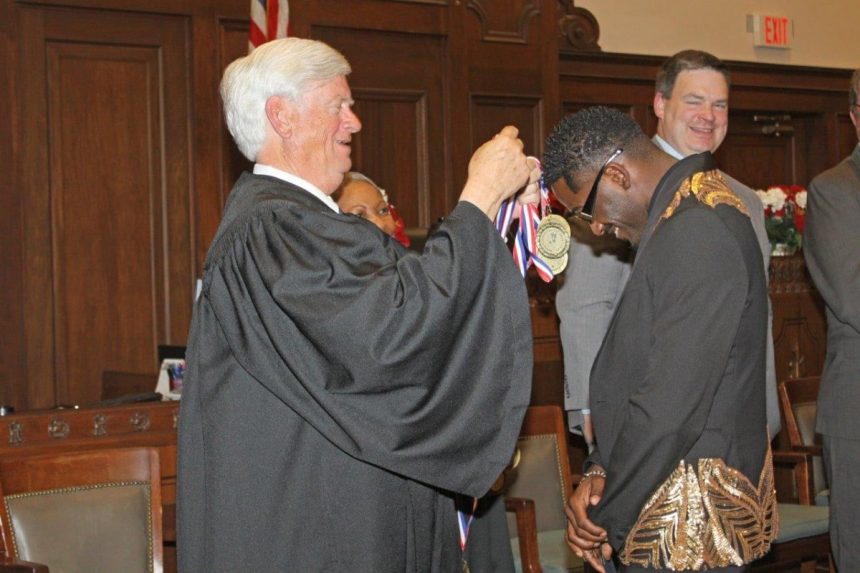(Pictured above: Hinds Circuit Drug Court Supreme Court Justice Mike Randolph and graduate Max Gallion)
Twenty-one Hinds Circuit Drug Court graduates on Wednesday pushed the statewide total of intervention court graduates past 5,600 during the past eight years.

“That’s why I do what I do,” Supreme Court Chief Justice Mike Randolph told the graduates.
The graduates have improved their own lives and their families’ lives and supported themselves, all while saving the state an estimated $463 million in incarceration costs since 2012. And that doesn’t take into account the humanitarian aspect: 522 drug-free babies born to mothers in drug courts will save an estimated $40 million by the time those children reach age 18. The government pays most of the staggering medical bills of children born to mothers on drugs.
The Chief Justice is leading efforts to increase the number and kinds of intervention courts in the state. He hopes to establish eight mental health court programs, add eight veterans court programs and create three more drug courts, if the Legislature approves the funding. More than 4,000 people have become employed since Fiscal Year 2012 due to the requirements of drug courts, Chief Justice Randolph said. Graduates’ educational gains under drug court supervision during the past eight years include:
- more than 424 GEDs earned;
- more than 476 attended vocational school;
- more than 1,320 attended post-secondary school;
- more than 750 attended traditional schools;
- more than 150 attended alternative schools.
The state currently has 40 drug courts. There are 22 adult felony drug court programs. Special programs for veterans currently operate in two of them: the 12th Circuit and 19th Circuit. There are also three adult misdemeanor drug court programs, 12 juvenile drug courts and three family drug courts.
Drug courts reached statewide coverage in early 2013 when the felony adult drug courts were expanded to all 22 Circuit Court districts. Drug courts have been in operation in Mississippi for 20 years. Hinds County has the second oldest program, which began operation in 2000. The Dec. 11 graduation ceremony is the 49th graduation exercise for the Hinds Circuit Drug Court.
Hinds Circuit Judge Winston Kidd, who supervises the Drug Court, explained that it is a special program that addresses alcohol and drug addiction, the underlying causes of many crimes. The program uses sanctions and incentives to change participants’ behavior. “Here in Drug Court, we are not only trying to changes lives. We are trying to save lives,” Judge Kidd said.
Graduate Max Gallion, 31, of Jackson, said, “It works if you work.”
Chief Justice Randolph praised the 21 Hinds Circuit Drug Court graduates for their personal accomplishments. “The most important thing you all have acquired is self-worth,” he said. “You have overcome the biggest hurdle in your life, but you’ve got to be careful,” he said, cautioning them to continue to make good choices.
Graduates one by one stepped to the microphone to thank God, the judges, court staff, treatment providers, probation officers, their mothers, their wives and their families.
Graduate Chris McMurtrey, 41, of Jackson, said it took him years to successfully complete the program. McMurtrey explained that he didn’t get into any more trouble. It just took a long time to pay fines and fees that totaled about $7,800. He has worked as a veterinary technician for most of the time he has been in Drug Court.
Chief Justice Randolph and Senior Circuit Judge Tomie Green presented each graduate with a medallion after Judge Kidd gave each one a graduation certificate. The Chief Justice told McMurtrey, “If I had an extra one, I’d give you two.”
Judge Green said, “I have never given up hope that we will get drugs out of our communities, out of your lives, and each class will get bigger and better.” She said the graduation marks participants’ completion of the court program, “but it is a commencement for the beginning of a new life.”







